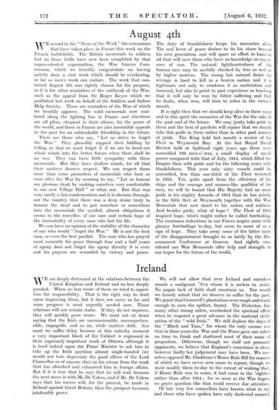August 4th
wE record in the "News of the Week" the ceremonies that have taken place in France this week on the French battlefields. The British memorials to soldiers lost on those fields have now been completed by that unprecedented organization, the War Graves Com- mission, which we heartily congratulate on having quietly done a vast work which should be everlasting, so far as men's work can endure. The week that con- tained August 4th was rightly chosen for the purpose, as it is for other reminders of the outbreak of the War, such as the appeal from Sir Roger Keyes which we published last week on behalf of the Soldiers and Sailors Help Society. These are reminders of the War of which we heartily approve. The solid memorials now scat- tered along the fighting line in France and elsewhere are all pleas, eloquent in their silence, for the peace of the world, and those in France are also irresistible appeals to the past for an unbreakable friendship in the future.
There are those who say, "Let us strive to forget the War." They plausibly support their bidding by telling us that we must forget it if we are to bend our whole minds into the better future when there shall be no war. They can have little sympathy with these memorials. But they have shallow minds, for all that their motives deserve respect. We can respect them more than some promoters of memorials who hurt us soon after the War by seeming to say, "Let us honour our glorious dead, by making ourselves very comfortable in our new Village Hall" or what not. But that was very rarely a fair condemnation and it is obvious through- out the country that there was a deep desire truly to honour the dead and to put somehow or somewhere into the memorials the symbol, almost ubiquitous it seems to the traveller, of our sure and certain hope of the immortality of every man who lost his life.
We can have no opinion of the stability of the character of one who would "forget the War." He is not the best man, or even the best pacifist. The man who has prayed most earnestly for peace through four and a half years of agony does not forget the agony directly it is over and his prayers are rewarded by victory and peace. The duty of thankfulness keeps his memories alive. The real lover of peace desires to do his share beyond his own generation, and will spare no effort to hand on all that will save those who have no knowledge or experi- ence of war. The 'natural lightheartedness of the human race may be usefully checked by fear as well as by higher motives. The wrong but natural desire for revenge is hard to kill in a beaten nation and it is legitimate not only to condemn it as unchristian and immoral, but also to point to past experience as teaching that it will only be won by bitter suffering and that its fruits, when won, will turn to ashes in the victor's mouth.
It is right then that we should keep alive in these ways and in this spirit the memories of the War for the sake of the past and of the future. We may justly take pride in them and the best of pacifists will rejoice that we should take this pride in them rather than in other past sources of pride. The King held last month a review of his Fleet in Weymouth Bay. At the last Royal Naval Review held at Spithead eight years ago there were assembled 193 men-o'-war, a small display of naval power compared with that of July, 1914, which filled the Empire then with pride and for the following years with thankfulness. This year only sixty vessels could he assembled, less than one-third of the Fleet reviewed in 1924. Yet, quite apart from the efficiency of his ships and the courage and seamen-like qualities of his men, we will be bound that His Majesty had no more pride in his mighty Armada of 1914 than he has jointly in the little fleet at Weymouth together with the War Memorials that now stand to his sailors and soldiers. And besides pride, what of hope ? The Fleet of 1914 inspired hope, which might rather be called foreboding. The enormous reductions in our Forces inspire some with gloomy forebodings to-day, but seem to more of us a sign of hope. They take away some of the bitter taste of the disappointment brought to us lately by the Dis- armament Conference at Geneva. And rightly con- sidered our War Memorials offer help and strength to our hopes for the future of the world,


























 Previous page
Previous page